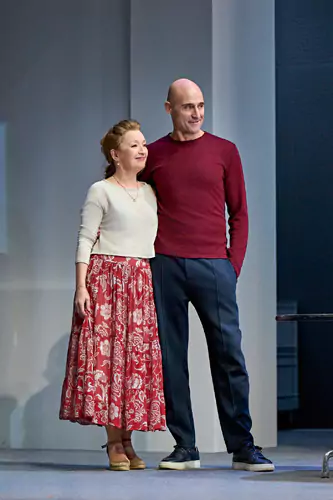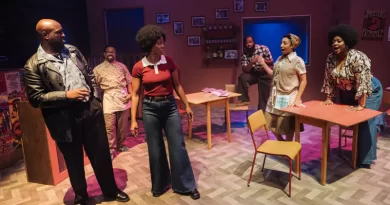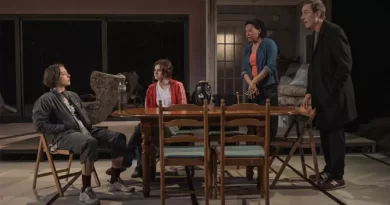“Oedipus” at Wyndham’s Theatre
Neil Dowden in the West End
20 October 2024
Not that it’s ever been in abeyance for too long, but Greek tragedy is having a fatal impact on the London stage these days. Robert Icke’s modern version of Oedipus “after” Sophocles has just opened at Wyndham’s Theatre, hot on the heels of Alexander Zeldin’s contemporary retelling of Antigone in The Other Place at the National Theatre. And in January beware of an onslaught of Sophoclean drama with an adaptation of Oedipus by Ella Hickson at the Old Vic (starring Rami Malek and Indira Varma, co-directed by Matthew Warchus and Hofesh Shechter) and Elektra at Duke of York’s (translated by poet Anne Carson with Daniel Fish directing Brie Larson), while Alexander Raptotasios’s new play Antigone [on Strike] at Park Theatre is also inspired by the ancient playwright.
Lesley Manville and Mark Strong.
Photo credit: Manuel Harlan.
Of course Icke has form with pumping new blood into classical Greek tragedy. His revelatory 2015 production of Oresteia at the Almeida transferred to the West End and then New York, winning plaudits everywhere. His Oedipus is perhaps not as radical an interpretation but it turns the play into a riveting political thriller-cum-domestic-drama, boasting outstanding lead performances from Mark Strong and Lesley Manville. Although it’s one of the best-known tales in world drama, the suspense is palpable throughout and the key moments of revelation prompt gasps from some in the audience such is the power of the storytelling.
Sticking to the Aristotelian unities of time, place, and action – and retaining the original character names – Icke has set the play on the night of an election in the campaign headquarters of Oedipus who is expected to win a landslide victory and become the new Theban leader. In a short prologue, we see newscast video projected onto the curtain of Oedipus surrounded by exuberant, placard-waving supporters telling the media that he believes in full transparency with the electorate. He promises to make public his birth certificate (shades of Trump’s “birther” conspiracy theory against Obama) and to find out how the previous leader Laius died. Little does he know how disastrous this will prove to be.
Though the mood is jubilant as Oedipus anticipates success with his wife Jocasta and three children, plus party officials, a couple of unexpected arrivals are warning signals. First his mother Merope turns up demanding to speak to him alone urgently (while his father is lying critically ill in hospital). Then blind New Age-style prophet Teiresias tells him that Jocasta’s brother Creon will assume power, which leads Oedipus to accuse Creon of plotting against him before dismissing Teiresias as a crackpot. But the truth will out. As the large digital clock counts down two hours to the election result, shocking events from the past are uncovered that turn triumph into catastrophe.
Photo credit: Manuel Harlan.
Icke has kept the main narrative drive of a man who brings about his own downfall through his obsession with unearthing the truth about his roots. But there are important changes: Jocasta is a child victim of rape and was forced to give up her baby, while Oedipus killed the old man after a joyriding accident rather than a quarrel on the highway. The supernatural and mythological elements of Sophocles – including the Delphic oracle and the Sphinx – have been removed, though the answer to the riddle is given by Creon. Above all, the thrust of this version is to show how the tragedy is not an externally imposed fate being fulfilled but the knock-on effects of human frailty.
There is real intensity especially in the relationship between Oedipus and Jocasta – portrayed with full-blooded sexuality – as they come to the desperate realization it has to end, but knowing they cannot live without each other. The countdown seems inexorable as a tragedy is played out in real time. A brief, touching epilogue rewinds to show them as a young couple full of hope for the future as they move into what becomes the family home.
Icke’s Oedipus was first staged in Dutch by Ivo van Hove’s then company Toneelgroep Amsterdam (now Internationaal Theater Amsterdam) in 2018, before transferring to Edinburgh International Festival the following year. But the planned English-language premiere in London in 2020 – with Helen Mirren as Jocasta – was scuppered by Covid, so it has taken until now for it to happen – and it’s certainly been worth the wait.
Hildegard Bechtler’s understated, functional office design – with glass tables, tubular chairs, notice boards, TV monitor, and of course red illuminated clock marking days, hours, minutes, and seconds – becomes sparser as the layers of falsehood are peeled back. This is accentuated by the unflinching strip lighting by Natasha Chivers, while Tom Gibbons’ unsettling sound design rumbles in the background.
Strong gives a superbly persuasive performance in the title role, as a reforming populist politician who believes a little too much in his own exceptionalism, and a loving family man who enjoys the company of his children and is passionately turned on by his older wife. He is matched by Manville’s playful, confident Jocasta who has overcome her abusive early years – about which she speaks movingly – to seize her chance of happiness with both hands. The moment they discover the nature of their relationship is devastating, followed by an extraordinary scene as shell-shocked side-by-side they strip and silently dress in formal clothes for the official announcement of the election win. Their visceral need of and desire for each other results in one final, desperate clinch before they break off as Manville crawls away and Strong relapses into a foetal position.
There is excellent support from June Watson as the anguished, cantankerous Merope with a long-held secret to unburden and Michael Gould as the spin-doctor Creon who strives to control Oedipus’ open style of politics. And there are interesting dynamics between Oedipus’ and Jocasta’s two sons Polyneices (James Wilbraham) and Eteocles (Jordan Scowen) whose play-fighting prefigures the subsequent civil war, as well as the confrontational frankness of daughter Antigone (Phia Saban) which continues the tragic cycle into the next generation.











